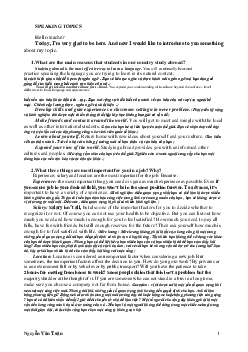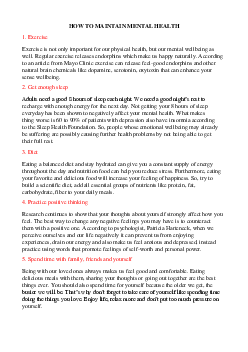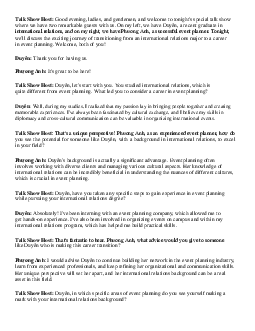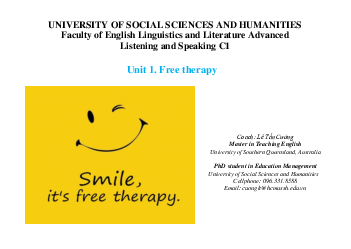



Preview text:
SERENDIPITY
Serendipity is the ability or phenomenon of finding valuable or agreeable things not sought
for. Some people may think that serendipity is important because it can lead to unexpected
discoveries, opportunities, or connections that enrich one’s life. Others may think that
serendipity is not important because it depends on chance and luck, and one should rely on
one’s own efforts and goals to achieve happiness and success.
serendipitous: happening or found by chance
It was a serendipitous encounter that led him to discover his passion for music.
serendipitously: in a way that involves serendipity
He serendipitously stumbled upon a rare coin while walking on the
beach. serendipitist: one who finds valuable or agreeable things not sought for
She was a serendipitist who always looked for the positive side of
things. serendipper: a person who actively seeks out serendipity
kismet: fate or destiny
fortuity: the quality or state of being accidental
fateful: having important or decisive consequences
happenchance: a chance occurrence or event
providential: occurring at a favorable time; opportune
1. Can anyone become a divergent thinker? Why (not)?
Divergent thinking is the process of creating multiple, unique ideas or solutions to a
problem that you are trying to solve . Divergent thinking is often considered a creative skill
and can be developed through practice and training . Therefore, anyone can become a
divergent thinker if they have the will and effort to improve this ability.
Some vocabulary related to divergent thinking are:
brainstorming: the process of generating many ideas in a group or individually
lateral thinking: the ability to think of different or unusual ways to approach a problem
originality: the quality of being new, different, or innovative lOMoAR cPSD| 41487872
flexibility: the ability to adapt to changing situations or requirements
fluency: the ability to produce a large number of ideas quickly
2. Does technology make us less creative? Why (not)?
Technology can have both positive and negative effects on creativity, depending on how it
is used. Technology can enhance creativity by providing access to information, tools, and
resources that can inspire new ideas, facilitate collaboration, and support implementation .
Technology can also hinder creativity by distracting attention, reducing motivation, and limiting imagination .
Some vocabulary related to technology and creativity are:
innovation: the act of introducing something new or improved
digital literacy: the ability to use and understand digital technologies effectively
media: the means of communication, such as television, radio, newspapers, and the internet
artificial intelligence: the science and technology of creating machines or
software that can perform tasks that require human intelligence
virtual reality: a computer-generated simulation of a three-dimensional
environment that can be interacted with by a user
3. Do you prefer a short, but crowded route or a long, but peaceful route to work? Why?
I prefer a long, but peaceful route to work because I enjoy the scenery, the quietness, and
the opportunity to relax and think. A short, but crowded route might be stressful, noisy, and
boring. However, some people might prefer a short, but crowded route because they want to
save time, money, and energy. A long, but peaceful route might be tiring, expensive, and lonely.
Some vocabulary related to routes and preferences are:
commute: the act of traveling from home to work and back
traffic: the movement of vehicles or people on roads or public areas
scenery: the natural features of a landscape that are attractive to look at
stress: the feeling of being under too much pressure or worry lOMoAR cPSD| 41487872
boredom: the state of being bored or uninterested Compare
Serendipity and divergent thinking are both related to creativity, but they are not the
same thing. Serendipity is the occurrence of an unexpected or fortunate discovery, often by
chance or accident. Divergent thinking is the generation of multiple ideas or solutions to a
problem, often by exploring different perspectives or possibilities:
Divergent thinking involves spontaneous brainstorming, while serendipity
involves finding connections or insights that were not anticipated or intended.
Divergent thinking requires significant creativity and imagination, while
serendipity requires curiosity and openness to new experiences.
Divergent thinking is a skill that can be learned and practiced, while serendipity is
a result that can be influenced but not controlled.
Divergent thinking is a process that helps generate many ideas or possibilities,
while serendipity is an outcome that helps discover one idea or solution.
Serendipity is the occurrence of an unexpected or fortunate discovery, often by
chance or accident. It is often associated with creativity, innovation, and luck
Some of the pros of serendipity are:
It can lead to valuable and surprising discoveries that would not have been
possible otherwise. For example, many inventions, such as penicillin, were the result of serendipity
It can enrich our lives with joy, wonder, and gratitude. Serendipity can make us feel
more connected to ourselves, others, and the world. It can also inspire us to pursue our passions and dreams
It can stimulate our curiosity and creativity. Serendipity can challenge us to look at
things differently, to ask questions, and to explore new possibilities. It can also help
us overcome mental blocks and generate new ideas
Some of the cons of serendipity are:
It is unpredictable and uncontrollable. We cannot plan for serendipity or rely on it
to solve our problems. We can only increase our chances of experiencing it by
being curious, open-minded, and observant
It can be missed or ignored. We may not notice or appreciate serendipitous
moments in our lives if we are too busy, distracted, or stressed. We may also
dismiss or reject them if they do not fit our expectations or goals lOMoAR cPSD| 41487872
It can be misinterpreted or misused. We may attribute too much meaning or
significance to serendipitous events, leading to false beliefs or confirmation bias.
We may also exploit or manipulate serendipity for our own benefit, harming ourselves or others.
Divergent thinking is a creative process that helps generate a wide range of ideas or
possibilities. It involves thinking broadly, exploring different angles, and coming up with
multiple solutions to a problem. The main goal of divergent thinking is to promote
creativity by allowing a free flow of thoughts without judgment or evaluation.
Some of the pros of divergent thinking are:
It boosts teamwork, as it encourages different team members to share their ideas
and thoughts. This can help to create a more collaborative environment where
everyone feels like they are contributing to the task
It stimulates curiosity and creativity, as it challenges us to look at things differently,
to ask questions, and to explore new possibilities. It can also help us overcome mental blocks and generate new ideas
It enhances problem-solving, as it can help us find new and innovative solutions to
complex or ambiguous problems. It can also help us identify opportunities and potential improvements
Some of the cons of divergent thinking are:
It can be overwhelming and time-consuming, as it can produce too many options
and have difficulty choosing the best one. It can also lead to confusion and
distraction, as it can make us lose focus and direction
It can encounter resistance or criticism, as it can challenge existing norms
and conventions. It can also be seen as unrealistic or impractical, as it can
ignore constraints and limitations
It can be misinterpreted or misused, as it can lead to false assumptions or
irrelevant ideas. It can also be influenced by biases or emotions, as it can favor
personal preferences or opinions
Therefore, it is important to balance divergent thinking with convergent thinking, which
is the process of selecting and refining the best solution from a set of options. Convergent
thinking can help us make decisions, evaluate ideas, and implement solutions. However,
convergent thinking also has its drawbacks, such as being too narrow-minded, rigid, or biased lOMoAR cPSD| 41487872
To summarize, divergent thinking is beneficial for creativity, but it also has its
limitations. You need to use it in combination with convergent thinking to achieve the best results





